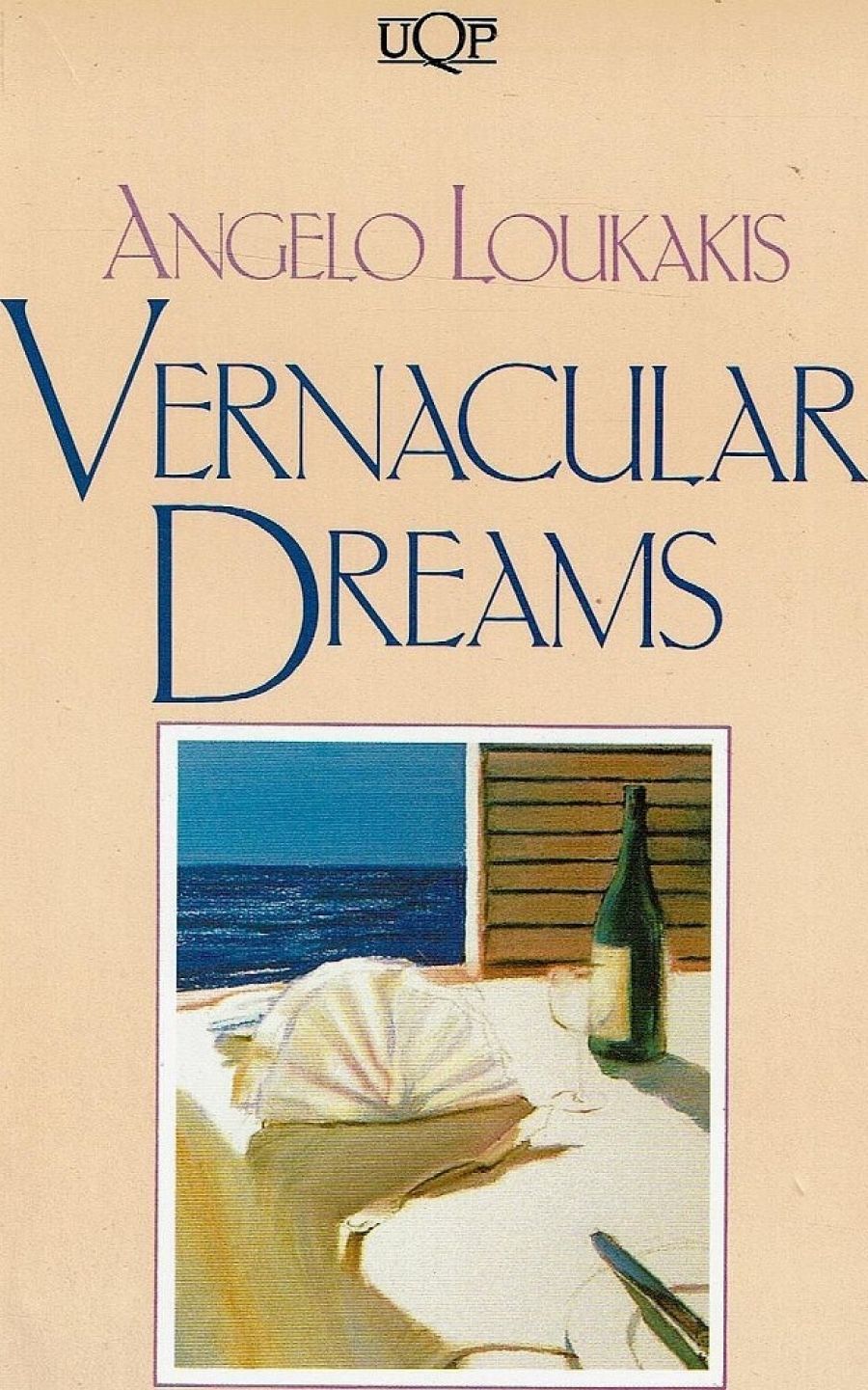
- Free Article: No
- Contents Category: Fiction
- Review Article: Yes
- Online Only: No
- Custom Highlight Text: In ‘Partying on Parquet’, the story from Vernacular Dreams chosen by Don Anderson for inclusion in Transgressions, the hapless Steve attempts to hold a party for his HSC tutor Penny. The party is split into two small groups: Penny and her ‘uni friends’ Jan and Greg, and Marina and Pavlos, ‘dumb ethnics like himself whom he had met at Greek dancing class’. Naturally everything goes wrong, from the loudness of heels on the parquet floor to the botched lunge at Penny in the kitchen. But this is not just a simple story of humiliation. Steve is depicted at the end standing under the shower moving from resolutions (‘As for Greg and Jan, the only way he would ever be able to get on top of smart arses like them was to beat them at their own game,’) to what might be called ‘shower dreams’: ‘The steam had got so thick, he could hardly see a thing. He stared up at the ceiling. It was hanging there like a mist, a fog, with the light shining through; and it as his for as long as he wanted.’
- Book 1 Title: Vernacular Dreams
- Book 1 Biblio: University of Queensland Press, 179 pp, $19.9$ hb
Steve’s combination of self-doubt and resolution is common to many of Loukakis’s characters, particularly the young dreamers of Vernacular Dreams. Steve’s rejection of dumb ethnics like himself is balanced to some extent in ‘Hooray for Haralambos’, when the cross, restless central character, ordered by the department store where he works to escort a famous Italian designer around town (‘Your own foreign background should stand you in good stead here.’), joins the designer’s models in a small rebellion, announcing ‘And my name isn’t Neil. It’s Haralambos.’
The young males who are the protagonists of about a third of the stories in Vernacular Dreams are callow, self-centred, frustrated and isolated. The other stories widen the range of characters considerably, but the theme remains the same; Loukakis’s characters are outsiders, whether they are looking back over peripheral lives, or dreaming vain dreams of an impossible future. The range is impressive. In ‘The Jigsaw Puzzle’, Becky finally leaves England to join her two sisters in Australia. The story opens with a glimpse into the mind (and life) of one of the expectant sisters, handled, as is nearly always the case in these stories, with great economy and skill by Loukakis. Becky’s misplaced gift for her nephew, a jigsaw puzzle bought in Australia depicting an archetypal English scene, is symbolic of many mistaken gestures by characters thrown into an alien context.
Loukakis writes in a style that might be described as chromatic realism. As a collection, Vernacular Dreams tends to leave an impression of a certain monotony, perhaps brought about by the largely depressing lives and incidents depicted in the stories. Individually the stories are very finely crafted indeed, and their strengths really stand out (for this reader) when they are studied separately. A good example is ‘Our Own Business’. Murray, the central character, is a typical vernacular dreamer; the butt of his workmate’s practical jokes, he takes solace in the company of Diane, the Sales Manager’s secretary. What seems at first to be the expected story of a loner hanging on to the company of Diane and her husband becomes a much tougher account of a predator, cheated when Diane announces that they are going to move to Perth: ‘Just when he believed he was making some progress with her … Only a proper bitch could have done that to him.’ This perfectly shaped story closes, as it opens, by focusing on. Murray’s relentless calculator: ‘But he had yet to work out the total cost – the number of tanks of petrol it would take to get to Perth, times the price of a tank. He switched on his calculator.’
Like Heather Falkner, who reviewed Vernacular Dreams for The Australian, I am fascinated by Loukakis’s shift into a different mode in the last story in the collection, ‘Islands’. The move away from various realistic forms opens up a number of powerful themes, as well as providing the reader with a glimpse into a whole new set of fictional techniques untouched elsewhere in the book. ‘Islands’ is about, as the narrator says, ‘the real nightmares.’ Sent by a committee to chart ‘Our Heritage’, the narrator explores two islands: X, a Pacific island colonised by ‘our first settlers’ and then forgotten, and Y, a Mediterranean island, source of much post-war migration. The narrator discovers each island has a smaller island of its own. The nightmares have their source in the sub-island Y (i), which housed first a fortress, then a leper colony.
‘Islands’. becomes a parable about the new ‘ethnic awareness’, but also about the nature of self-knowledge:
There is nothing difficult about what I am saying. This isn’t fiction. I don’t write fiction, as you above all must be aware. This is not some story, trading off ‘mysteries’ and ‘enigmas’, busily developing the felicitous ambiguities one sees in certain kinds of literary prose.
I hope that Loukakis continues to pursue such explorations of ‘fiction’ in further stories.


Comments powered by CComment